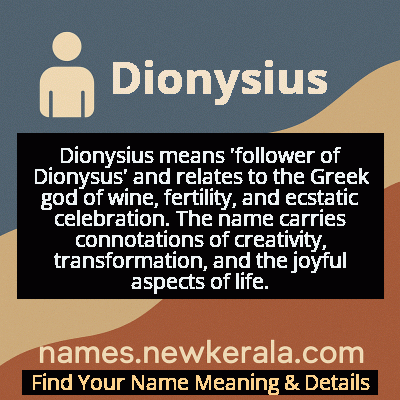Dionysius Name Meaning & Details
Origin, Popularity, Numerology Analysis & Name Meaning of Dionysius
Discover the origin, meaning, and cultural significance of the name DIONYSIUS. Delve into its historical roots and explore the lasting impact it has had on communities and traditions.
Name
Dionysius
Gender
Male
Origin
Greek
Lucky Number
9
Meaning of the Name - Dionysius
Dionysius means 'follower of Dionysus' and relates to the Greek god of wine, fertility, and ecstatic celebration. The name carries connotations of creativity, transformation, and the joyful aspects of life.
Dionysius - Complete Numerology Analysis
Your Numerology Number
Based on Pythagorean Numerology System
Ruling Planet
Mars
Positive Nature
Generous, passionate, energetic, and humanitarian.
Negative Traits
Impulsive, impatient, moody, and can be overly emotional.
Lucky Colours
Red, maroon, scarlet.
Lucky Days
Tuesday.
Lucky Stones
Red coral, garnet.
Harmony Numbers
1, 2, 3, 6.
Best Suited Professions
Military, sports, philanthropy, leadership roles.
What People Like About You
Courage, energy, leadership, generosity.
Famous People Named Dionysius
Dionysius of Halicarnassus
Greek historian and teacher of rhetoric
Wrote 'Roman Antiquities', a 20-volume history of Rome from mythical origins to the First Punic War
Dionysius the Areopagite
Biblical figure and Athenian judge
Converted to Christianity by Paul the Apostle, later venerated as a saint and first bishop of Athens
Dionysius Exiguus
Monk and scholar
Created the Anno Domini era system still used today and compiled important collections of canon law
Dionysius I of Syracuse
Tyrant of Syracuse
Ruled Syracuse for 38 years, expanded its power significantly, and was known as both a patron of arts and ruthless ruler
Name Variations & International Equivalents
Click on blue names to explore their detailed meanings. Gray names with will be available soon.
Cultural & Historical Significance
The name gained further prominence through early Christian history with Saint Dionysius the Areopagite, who became the patron saint of Athens. Several popes and numerous saints throughout Christian history bore variations of this name, allowing it to transition smoothly from pagan to Christian contexts. During the Renaissance, the name experienced renewed interest as classical learning was revived, and it has maintained a presence in Western naming traditions through various linguistic adaptations across Europe. The name's journey from ancient Greek religion through Christianity to modern usage demonstrates its remarkable cultural adaptability and enduring appeal.
Extended Personality Analysis
Individuals named Dionysius are often perceived as charismatic, creative, and emotionally expressive. They tend to possess a natural magnetism that draws others to them, combined with an appreciation for beauty, art, and celebration. Like their namesake deity, they may exhibit a dual nature—capable of both disciplined intellectual pursuit and spontaneous, joyful expression. Their personality often balances serious contemplation with a love for social interaction and communal experiences.
These individuals typically demonstrate strong leadership qualities tempered by empathy and understanding. They often excel in fields requiring both analytical thinking and creative expression, showing versatility in their approach to challenges. While they can be serious and focused when necessary, they also value pleasure, aesthetics, and the enjoyment of life's finer things. Their emotional depth allows them to connect with others on meaningful levels, though they may sometimes struggle with balancing their intense passions with practical considerations. The name suggests someone who embraces life fully, finding meaning in both intellectual discovery and sensory experience.
Modern Usage & Popularity
In contemporary times, Dionysius remains a relatively uncommon but culturally significant name, primarily used by families with Greek heritage or those appreciating classical names. While the simplified forms 'Dennis' and 'Denis' gained widespread popularity in the 20th century, the full Dionysius has maintained a niche appeal among parents seeking distinctive names with historical depth. The name experiences occasional revivals during periods of renewed interest in classical education and mythology. In recent years, it has seen slight increases in usage among academic families and those involved in arts and humanities, though it remains outside the top 1000 names in most English-speaking countries. Its usage is more consistent in Greece and Cyprus, where it maintains traditional appeal while being perceived as somewhat formal or academic in tone.
Symbolic & Spiritual Meanings
Symbolically, Dionysius represents the reconciliation of opposites—civilization and wild nature, order and chaos, restraint and ecstasy. The name embodies the transformative power of creativity and the human capacity for both intellectual pursuit and emotional expression. It symbolizes the journey from suffering to joy, mirroring the mythological narrative of Dionysus's death and rebirth. The name also carries connotations of community and connection, representing the social bonds formed through shared experiences of art, celebration, and spiritual practice. As a symbolic bridge between mortal and divine, it suggests the potential for human transcendence through creative and spiritual expression, while also representing the cyclical nature of life, death, and regeneration that characterized the Dionysian mysteries.

